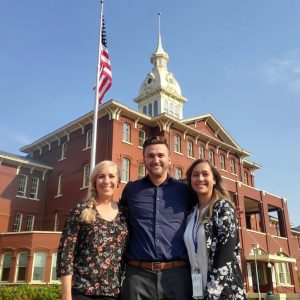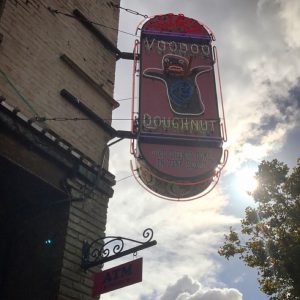Application Deadline:
November 1Interview Notification Deadline:
December 1
Interview Dates:
January 2, 7, 9, & 14Program Start Date:
August 15Program Faculty
OSH-PIP Administration
Dr. Julia Howe (pronouns: she/her/hers) is the Chief of Psychology at OSH. She has worked at OSH since August 2014 and has worked as a psychologist and manager on both the Salem and Junction City campuses. She is a graduate of the University of Iowa and completed her predoctoral internship at the University of New Mexico Health Sciences. She has experience working with children, adolescents, and adults in a variety of clinical settings in addition to state hospital including in juvenile and adult corrections, community mental health center, inpatient and outpatient mental health services, and specialized inpatient behavioral intervention program. Her clinical interests include evidence-based practices, recovery-oriented treatment of psychosis, mental health policy, training and development, resiliency and positive psychology, and organizational health.
Dr. Sarah Robertson (pronouns: she/her/hers) serves as the Training Director of OSH-PIP. She is also a supervising psychologist in the Competency Restoration Program. She has worked at OSH since September 2016. She received her doctoral degree from Ferkauf Graduate School of Psychology, Yeshiva University. She completed her internship training at the Yale Department of Psychiatry Adult Community Mental Health track and went on to complete a postdoctoral fellowship at the VA Connecticut in the Psychosocial Rehabilitation program. Dr. Robertson’s interests include recovery-oriented treatment of complex trauma and psychosis, program development, training, and mental health policy.
Internship Training Committee Members
Dr. Andrea Avila (pronouns: she/her/hers) is the supervising psychologist for the Psychology Assessment rotation. Within that rotation, she supervises psychological assessments for diagnostic clarity, personality assessment, treatment recommendations, violence risk assessment, and cognitive impairments. She is also a Certified Forensic Evaluator and periodically completes forensic evaluations at OSH as well as in private practice. Dr. Avila completed her JD/PhD at University of Nebraska-Lincoln in the serious mental illness research group with Dr. Will Spaulding with concentrations in forensics, statistics, and criminal law. She completed her internship with OSH-PIP and a forensic fellowship at Patton State Hospital. She then returned to OSH to work in FES for two years before transitioning to her current position. Her past experience includes community mental health programs with coordinated service provision, outpatient individual therapy, corrections, and probation department projects, as well as state hospital work. She has several published peer-reviewed journal articles, law review articles, and book/textbook chapters, as well as ongoing research projects. She is currently serving as co-chair for the 2023 AP-LS conference. Her interests include psychiatric advanced directives, improving the utility and scientific rigor of general and forensic assessments, developing and testing comprehensive treatment services for people with SMI, and development of law/policy that reflects evidenced-based practices and a recovery orientation for people with SMI.
Dr. Nicole Ball (pronouns: she/her/hers)is a supervising psychologist in the Competency Restoration Program and has worked at OSH since 2011. She is also a Certified Forensic Evaluator and maintains a private practice. Dr. Ball received her doctoral degree from Pacific Graduate School of Psychology (currently Palo Alto University). She completed her internship training at the Togus VA Medical Center in Augusta, Maine. She completed her post-doctoral training at Forensic Psychology and Neuropsychology Services, P.C. She has earned her law degree from Golden Gate University School of Law through a joint J.D./Ph.D. program. Her clinical and research interests include forensic evaluation, neuropsychological assessment, competency restoration, assessment of psychopathology, and supervision.
Dr. Jonathan Cohn (pronouns: he/him/his) is a supervising psychologist for the Forensic Evaluator Service (FES) rotation. Originally from Los Angeles, he completed his undergraduate degree at the University of Miami, followed by his masters in psychology from the University of Hawaii. He earned his doctorate in clinical psychology from the University of North Texas where he completed specialty tracks in forensic psychology and neuropsychology. He completed his pre-doctoral internship at OSH-PIP and a forensic fellowship at UMass Chan Medical School. He then returned to work at Oregon State Hospital full time. He has training in both forensic and neuropsychology and has published multiple peer-reviewed journal articles in the areas of forensic assessment, neuropsychology, and serious mental illness.
Dr. Reid Faith (pronouns: he/him, they/them) received his doctoral degree from Rosalind Franklin University of Medicine and Science. He completed his clinical internship at Oregon State Hospital (2022-2023 cohort) and is currently completing his post-doctoral residency at Oregon State Hospital on a Harbors unit. His clinical and research interests include psychopathy, particularly among individuals with sexual offense histories; treatment and assessment of serious and persistent mental illness; and forensic assessment of both competency to stand trial and criminal responsibility.
Dr. Amie Hvizdak (pronouns: she/her/hers) is a supervising psychologist for interns in the Risk Assessment rotation. She has worked at OSH since December 2015, with experience as a psychologist in the Sexual Offending Treatment Program (SOTP) on the Salem campus and, more recently, as a Risk Assessment psychologist in Junction City where her primarily duties include conducting violence, fire-setting, sexual risk assessments. She received her doctoral degree from the Wisconsin School of Professional Psychology and completed both her internship and post-doctoral training at Torrance State Hospital. Her clinical and research interests include sexual and violence risk assessment, forensic evaluation, and personality and psychopathy assessment. She also maintains certification as a clinical sex offense therapist and forensic evaluator in Oregon.
Dr. Colten Larsen (pronouns: he/him/his) is a supervising psychologist in the Forensic Evaluation Service (FES) rotation. He obtained his doctorate and master’s degree in clinical psychology from George Fox University in Oregon, as well as a master’s degree in forensic and legal psychology from Marymount University in Virginia. Prior to moving back to Oregon and joining OSH full-time in 2023, Dr. Larsen completed a forensic postdoctoral fellowship in Albuquerque, NM, at a private practice and his doctoral internship with the Harris County Juvenile Probation Department in Houston, TX. Over the years, he has gained training in a wide range of psychological and forensic evaluations, including adult and pediatric neuropsychological assessment, sentencing/mitigation, competency to proceed, criminal responsibility, diminished capacity, juvenile amenability/waiver to adult court, violence and stalking risk, civil damages, and fitness for duty. Dr. Larsen’s clinical and academic interests include assessment, juvenile delinquency, program development/evaluation, LGBTQIA2S+ healthcare, and neurodevelopmental disorders.
Dr. Breann Martin (pronouns: she/her/hers) is a supervising psychologist for the Violence Risk Assessment minor rotation. She has worked at OSH in Junction City since 2015, completing various risk assessments and acting as a psychology representative for Risk Review. She completed her doctoral training at Alliant International University, her internship training at Torrance State Hospital in Pennsylvania, and her post-doctoral training at OSH. Dr. Martin’s interests include forensic evaluation, risk assessment, psychodiagnostic evaluation, and psychopathy.
Dr. Jessica Murakami-Brundage (pronouns: she/her/hers) is a supervising psychologist for the Competency Restoration rotation (major and minor). She received her doctorate in Clinical Psychology from the University of Oregon, where she also completed an MFA in Creative Writing. Dr. “MB” completed a predoctoral internship at the VA Pacific Islands Healthcare System and T32 postdoctoral fellowship at the Aaron T. Beck Psychopathology Research Center at the University of Pennsylvania. She is an APA Minority Fellow and has served on the APA Task Force on Serious Mental Illness/Severe Emotional Disturbance (TFSMI/SED) and the Board for the Advancement of Psychology in the Public Interest (BAPPI). She is passionate about the recovery model of mental illness and has been a unit psychologist at OSH since 2013. She recently co-authored a workbook for people with psychosis, which is forthcoming from New Harbinger in November of 2024.
Dr. Danielle Shallcross (pronouns: they/them/she/her) is a supervising psychologist for the Psychiatric Security Review Board (PSRB) and the Dialectical Behavior Therapy (DBT) rotations. They are also the lead in the gender affirming consultation team at OSH. They received their doctoral degree from Argosy University/Honolulu and completed internship and post-doctoral training at NYU Langone in Brooklyn, NY. They bring years of experience as a licensed clinical psychologist and certified alcohol and drug counselor having worked in a variety of settings and a variety of states. Their specialties include Addiction Recovery, Co-occurring Disorders, emotion regulation, and working with individuals in the LGBTQ+ communities. Current interests include expanding transgender and gender diverse care and working with individuals who experience non-consensus realities (known as individuals with SMI).
Dr. Molly Shepard (pronouns: she/her/hers) is a supervising psychologist for the Sexual Offending Treatment Program (SOTP) major and minor rotations. Within SOTP, she primarily conducts Psychosexual Evaluations, and provides sexual offense-specific treatment to patients committed forensically and civilly under the Psychiatric Security Review Board (PSRB). She completed her pre-doctoral internship with OSH-PIP (2019-2020), including the FES, GEI, DBT, and Risk Assessment rotations. She graduated from Palo Alto University with an emphasis in Forensic Psychology. Her clinical and research interests involve sexual risk mitigation, sexual offense-specific treatment, personality functioning, trauma-informed care, systems issues, cultural inclusivity, and supervision.
Dr. Jen Snyder (pronouns: she/her/hers) is a supervising psychologist in Guilty Except for Insanity (GEI) Program, and provides consultation across units as a part of the Behavioral Psychology Services team. She has worked at OSH since 2013. She received her doctoral degree from the University of Kansas in 1998. She completed her pre-doctoral internship at a joint program between the University of North Carolina at Chapel Hill Medical School and the Federal Bureau of Prisons, and completed a post-doctoral fellowship on the Pre-trial Evaluation Unit at Dorothea Dix Hospital in Raleigh, North Carolina. Before coming to OSH, she was the Chief Psychologist on both the Adult Admissions Unit and the Forensic Services Unit at Central Regional Hospital in Butner, North Carolina. Her clinical and research interests include assessment and treatment of severe psychopathology, particularly schizophrenia; assessment and restoration of competency to stand trial; and assessment and treatment of those found not guilty by reason of insanity.
Dr. Jared Speroni (pronouns: he/him/his) is a psychologist in the Forensic Evaluation Service (FES) and has worked at OSH since October 2021. Originally from Brooklyn, NY, he graduated from Palo Alto University with an emphasis in Forensic Psychology. He completed his doctoral internship at Florida State Hospital (2018-2019), including rotations in the maximum security Forensic Admissions Unit and Civil Transitions Unit. He completed his Forensic Postdoctoral Residency at the Center for Behavioral Medicine in Kansas City, MO (2019-2020). His clinical and research interests include risks associated with alcohol mixed-energy drinks, forensic evaluations, competency restoration, as well as the assessment of malingering and violence risk.
Dr. Kris Thomas (pronouns: he/him/his) is the supervising psychologist for the Neuropsychology Assessment and Psychotherapy minor rotations. He came to the hospital in 2014 after completing residency and working as a staff psychologist at Napa State Hospital. Dr. Thomas completed his graduate education at Fuller Graduate School of Psychology in Pasadena, California, where he emphasized neuropsychology, geropsychology and psychodynamic psychotherapy. He is especially interested in forensic neuropsychological assessment, personality and psychodiagnostic assessment, the development of strategies to improve cognitive functioning in persons with psychiatric and neurological conditions, and adapting psychoanalytic theory and interventions to the treatment of persons with severe psychiatric disorders in a hospital setting.
Interns
Past interns were asked to consider what they think applicants should know about training at this site; here is what they wanted to share:
“My time at OSH-PIP was truly amazing. I came into the year excited and that excitement was affirmed throughout my time. It was so nice to be part of an internship where the committee so clearly cares about us and our experiences. I loved my rotations, my supervisors, my cohort, and other hospital employees not associated with the internship. It really was all that I could ask for. I feel incredibly well set up for the future and am hopeful to return to OSH when the rest of my training is complete. Thanks for everything OSH-PIP ITC!” –Jonathan Cohn (2021-2022 Cohort)
“My internship training year with OSH-PIP truly exceeded my expectations. The training and supervision were phenomenal, and I consistently felt supported by my supervisors, both as a trainee and as a person. I found my experiences training with the Forensic Evaluation Service (FES) to be particularly valuable, and my evaluation experience and mentorship during that rotation helped me successfully attain a forensic evaluation-focused postdoctoral fellowship, a major career goal of mine. My other rotations during the program served as wonderful training experiences to fill gaps in my knowledge and training and to bolster existing skills. As the end of this year approaches, I feel comfortable to begin postdoc and work towards licensure and board certification. This year certainly brought challenges, but the program worked hard to ensure both our health and training were supported through the unexpected COVID-19 pandemic. I appreciate all the supervisors and will greatly miss OSH!”
–Jessi Hart (2019-2020 Cohort)
“I have highly valued my experience training at OSH-PIP. The supervisors, training opportunities, and access to resources are phenomenal. I felt very supported by all of the excellent Internship Training Committee supervisors; they are responsive, flexible, and incredibly dedicated to making the interns’ training experiences the best they can be. The seemingly endless rotation options proved difficult to decide between, with the ITC allowing for individualized adjustments to ensure we could all balance filling training gaps, enhancing existing skills, and further specializing in our specific interests. Training aside, the area surrounding Salem provides a variety of recreational activities and experiences. Heading east, the central Cascades are close enough to enjoy hiking, camping, and skiing, while travelling west provides access to the Oregon coast, and north offers many urban opportunities in the Portland area. I highly recommend OSH-PIP for anyone interested in working in a forensic, inpatient setting with individuals presenting with serious and persistent mental illness.”
–Molly Shepard, PhD (2019-2020 Cohort and current OSH employee)“OSH was my top choice for internship and I loved it even more than I expected. The diversity and depth of the training opportunities are unparalleled, due partially to the fact that OSH is the only state hospital in Oregon, and as such, has to meet a multiplicity of needs (e.g., GEI, competency, DBT, violence risk, geropsychology, neuropsychology, etc). The OSH-PIP faculty are knowledgeable, supportive, and invested in trainees’ success. They routinely go out of their way to incorporate feedback and individualize training plans to meet trainee needs and interests. In addition to the internship didactics, OSH has regular trainings and grand rounds on a number of relevant topics. There are also opportunities to do research. Really, whatever you want to do, chances are, you can do it at OSH in an engaging, supportive environment that also promotes work-life balance at a critical juncture for developing adaptive professional habits. It also doesn’t hurt that the hospital is only a few years old with lovely workplace amenities (e.g., laptops, standing desks, cafe, coffee shop, gym) and Salem, Oregon is one of the most beautiful areas in the country. I am so grateful I got to spend my internship year at OSH with amazing faculty and fellow interns.”
—Andrea Avila, JD PhD (2018-2019 Cohort and current OSH employee)
“After visiting OSH and meeting with the training staff on interview day, I immediately knew this was where I wanted to spend my internship training year. My initial positive impression was quickly affirmed after starting my first rotation. The rotations offered are a unique blend of forensic and clinical training with an acute patient population. There are a variety of experiences available ranging from forensic and violence risk assessment to treatment with different populations utilizing different treatment modalities. All of the supervisors are very knowledgeable and invested in the growth and development of the trainees. I would highly recommend OSH-PIP to anyone who is interested in working with a SPMI population, whether that be doing forensic or clinical work.”
—Ashley Estoup, PsyD (2018-2019 Cohort)
“I can’t recommend the training experience at OSH enough- the internship training committee is genuinely committed to your growth as an individual and professional. I learned so much, developed meaningful professional relationships, and fostered a healthy work-life balance. OSH was my top internship choice and I enjoyed my experience so much that I stayed as a resident and intend to continue working at the hospital!”
—Nicole Humphrey, PsyD (2018-2019 Cohort)
“I loved my internship experience at OSH. The internship provided new clinical experiences, tailored my training to my interests and needs, and created a supportive, engaging learning environment. The OSH-PIP faculty are excellent mentors, and I am so grateful to have trained with them. If that’s not enough, the Salem, Oregon area is beautiful and there is a great work-life balance. My time and training at OSH prepared me to become a competent clinical psychologist working in an inpatient hospital setting.”
—Elizabeth Turner, PsyD (2018-2019 Cohort)
“The OSH-PIP training team has a strong commitment to providing tailored training, within the bounds of their vast areas of expertise, that provided me with an incredibly personalized training experience. The atmosphere created within the OSH-PIP team and throughout the hospital is one that shows incredible dedication to the work and patients served in a fun and relaxed environment that embraces the unique qualities and personalities of the team and interns. Both supervisors and training directors were incredible at balancing supporting and fostering independence with bestowing their knowledge and skills to guide professional development. In my experience, this balance was key in bridging the gap between graduate school and early career.”
–Michelle Horner, PsyD (2016-2017 Cohort)
“Looking for a diverse forensic internship, the Oregon State Hospital Psychology Internship Program was very appealing. I ranked OSH-PIP as my number one choice for internship and am so happy I matched. My internship year was exactly what I hoped it would be. I was able to learn from experts in their respective fields who supported learning, professional development, and personal growth. The relationships I built during my internship have continued, and I still regularly speak and consult with many of my former supervisors. Additionally, The patient population and setting allowed the internship to be tailored to my interests while ensuring I was exposed to a wide range of experiences. Lastly, the Willamette Valley is a wonderful place to live with lots to do outside of work. You’re close to mountains, the coast, and a metropolitan area. Overall, I can’t recommend OSH-PIP enough for internship.”
–Andrew Orf, PsyD (2016-2017 Cohort and current OSH contractor)
“When I went through the internship interview process for the 2017-2018 training year, OSH was one of my top choices when I was comparing the training manuals of all the sites I applied to. I was excited to get an interview, but a snowstorm in Portland prevented me from having an in-person interview, and I ended up interviewing over the phone. Although there was disappointment, I could not meet the training committee, or see the site in person, I was still able to get a good feel for the training experiences I would have access to and some of the supervisors I could work with. I matched with OSH before ever even stepping foot in the state, and I have never once regretted it. I knew OSH would prepare to meet my overall career goals, and the training I received helped me become a well-qualified applicant for forensic postdocs. The atmosphere at OSH was one that cared about training interns to be the best at the workhey do. Everyone was welcoming and knowledgeable, and they collectively helped shape me into a confident and competent psychologist. I formed amazing relationships with many people that I have maintained to this day. I will always look back at my time at OSH as not only an amazing training year, but one of the best personal experiences I have had.”
—Jeff Washelesky, PsyD (2017-2018 Cohort)
“The OSH-PIP internship committee and my rotation supervisors provided a well-rounded and thorough forensic training experience. They truly supported my professional growth and development as well as promoted maintaining a healthy work/life balance. Additionally, living in Oregon offers many opportunities for the outdoor enthusiast as well as a fabulous dining culture. I enjoyed my experience at OSH so much that I decided to return as a licensed professional.”
—Mike Wojtkowicz, PsyD (2017-2018 Cohort and current OSH employee)
“My experience with the Oregon State Hospital Psychology Internship Program (OSH-PIP) provided me with invaluable experience and knowledge, which has prepared me for my current therapeutic work with the client population I currently serve (i.e., the chronically and severely mentally ill). The various and diverse clinical rotations were designed to offer a wide breadth and depth of clinical practice, and my supervisors were knowledgeable, experienced, thoughtful and caring. I highly recommend this program for any student who is interested in gaining experience working in a forensic hospital setting and developing skills in evidence-based assessment and treatment.”
—Sean Agopian, PhD (2015-2016 Cohort)
“Oregon State Hospital (OSH) prepared me for a thrilling and fulfilling career as a forensic psychologist. The breadth and the quality of their training opportunities were the ultimate reasons I ranked them as my top choice. Once I arrived on campus, I found that the rich history, the beautiful grounds, and the dedication of the supervisors enhanced my experience even more. Ultimately, it is not the site that creates a great training experience, it is the individuals managing the program. Five years later, I continue to model myself after the extraordinary supervisors I encountered at OSH.”
—Lexi Almaraz Caplan, PsyD (2015-2016 Cohort)
Work Life at OSH
360 photos of OSH Junction City
Available Resources
OSH-PIP interns have access to numerous resources. Each intern has an individual workspace within a large cubicle/hoteling station. Within the cubicle, each intern has a laptop with a secondary monitor, keyboard, and mouse; a bookcase; and a bulletin board with standard office supplies also available. There is also an extra standing desk for the cohort to share. Intern have access to administrative and IT support.
Assessment and other training materials are provided on site, and additional materials that may be needed may be purchased with Training Committee approval.
Interns may utilize resources from the Oregon State Library to support program evaluation, research, and literature review activities.
Interns can also become members of the hospital gym for a reduced rate ($5/month) for use during the training year.
Life in Oregon
The state of Oregon is known for its variety of outdoor opportunities with the coast, desert, and mountains all well within reach. Several state and national parks are hours away in Oregon, Washington, and California. Oregon has hundreds of wineries and tasting rooms available, which are well-known not just for pinot noir. The nearby city of Portland has many attractions including its art and music scene, locally made goods, restaurants, and breweries.
Life in Salem
 Salem is the capitol of Oregon located in the beautiful Willamette Valley. With a population of 160,000 and being approximately an hour from Portland, Salem is an ideal location for young professionals. Salem enjoys a “Mediterranean Climate,” getting most of its precipitation in the late fall through winter, while dry season is June – September. Winters are mild, with only occasional snowfalls and average temperatures in the low 50’s, while summer temperatures average in the 80’s.
Salem is the capitol of Oregon located in the beautiful Willamette Valley. With a population of 160,000 and being approximately an hour from Portland, Salem is an ideal location for young professionals. Salem enjoys a “Mediterranean Climate,” getting most of its precipitation in the late fall through winter, while dry season is June – September. Winters are mild, with only occasional snowfalls and average temperatures in the low 50’s, while summer temperatures average in the 80’s.
Salem is host to a number of local and cultural events. From May through October Salem features a weekly market, which emphasizes local products including arts, meats, produce, and baked goods. Additionally, summer includes a Wednesday farmers market downtown in Courthouse Square, a Holiday Gift Market in December, and a 60 year old indoor Saturday Public Market which is open year round. Culturally, Salem is host to the annual World Beat Festival sponsored by the Salem Multicultural Institute. The two day event is held in June at Riverfront Park and features international crafts, music, dance, and food from around the world. Salem is also home to the Salem Stampede (in the International Basketball League).
Salem also hosts a number of attractions including historical sites & museums, wineries & vineyards, a wide variety of restaurants, a number of state parks, and easy access to outdoor recreational activities. A comprehensive list of Salem’s attractions can be found at the TravelSalem homepage.
Wildfire Safety
The Pacific Northwest, including Oregon, can be known for its beautiful scenery and for wildfires. It is important to be ready for wildfire season in case your area is effected. Interns are recommended to be informed, sign up for local emergency alerts, be aware of the evacuation levels, have a plan, and an emergency go-kit. There are many resources available to help prepare you.
Oregon Wildfire Response & Recovery
Signing up for Emergency Notifications
Follow an Evacuation Checklist
- Scroll down to Evacuation Information and About Evacuation Levels

Our Recommendations!
Oregon Hikes and Parks
- Columbia River Gorge
- Crater Lake

- The Gorge from Vista House

- Mt. Bachelor

- Sand Mountain

- She Who Watches

- Silver Falls State Park (30 mins from Salem)


- Smith Rock State Park


- Timberline Lodge
Oregon Coast Destinations
- Astoria

- Cannon Beach
- Heceta Lighthouse and Cape Perpetua
- Lewis and Clark state park

- Lincoln City Beach

- Oswald West State Park

Oregon Events and Attractions
- Alberta Arts District
- Beer Festivals

- Bend, Oregon
- Cascades raptor center
- Dahlia Festival

- Distillery row
- First Thursday art/gallery walk
- Flower festivals each spring: Tulips, Peonies, Irises
- Hawthorne District
- Hillsboro Hops

- Horror film festival at the historic Hollywood theater

- Japanese Garden
- Oregon Zoo
- Portland Mermaid Parade
- Portland Opera in the Park
- Portland Winter Light Fest
- Powell’s
- Saturday market
- Voodoo Doughnut


- Wine tasting (not just for pinot noir)



- Salem-Keizer Volcanos site
- Salt and Straw
- Theater pubs (+other events)
- McMenamins Restaurants, Pubs & Bars
- Tillamook Creamery tours

- Tualatin Crawfish Festival

- UFO Fest
- The Wedge cheese fest
- West Coast Giant Pumpkin Regatta



Salem
- Parks:
- Baskett Slough National Wildlife Refuge

- Bush’s Pasture Park
- Minto Brown Island Park

- Orchard Heights Park
- Riverfront City Park
- Straub Nature Park
- Baskett Slough National Wildlife Refuge
- Food Truck Halls/Pods:
- Events/Attractions:
- Local Farmer’s market on Saturdays
- Outdoor Movie Viewing in a Park
- Summer Art Fair in Downtown Salem
- U-Pick farms (berries, apples, etc.) in the area
- Kid-Friendly Activities:
- Gilbert House Children’s Museum
- Playgrounds at local parks
- Salem Gymnastics Center
- Salem’s Riverfront Carousel
- Holiday-Related Events: